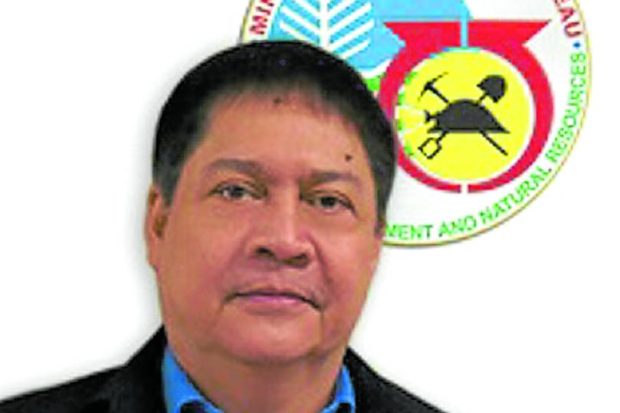MANILA, Philippines — The Constitution doesn’t prohibit any form of mining; it is the mining ban that is not in line with the highest law of the land.
This, in a nutshell, was the response of Mines and Geosciences Bureau (MGB) chief Wilfredo Moncano to the wave of criticism that greeted the recent decision of the Department of Environment and Natural Resources (DENR) to lift the four-year ban on open-pit mining.
Environment Secretary Roy Cimatu signed on Dec. 23 Department Administrative Order No. 2021-40, which lifted the ban on the open-pit method of extracting copper, gold, silver and complex ores. The order was issued eight months after President Rodrigo Duterte lifted the moratorium on new mining projects, through Executive Order No. 130.
“Our Constitution says we have the mineral resources and it doesn’t prohibit the extraction of these mineral resources. So, constitutionally, meron talagang diprensya yung kanyang order (her order is defective),” said Moncano, a lawyer, referring to the ban on open-pit mining imposed by then Environment Secretary Gina Lopez in 2017. Lopez died in 2019.
Moncano said Malacañang saw the potential of the mining sector as a contributor to the country’s fight against the coronavirus pandemic and to the recovery of the economy.
All cleared
The MGB chief also pointed out that all mining companies in the country that were employing the open-pit method had been cleared by the interagency Mining Industry Coordinating Council’s audit.
Prior to World War II, Moncano said the mining industry was the second biggest industry in the country, contributing 20 to 25 percent of the gross domestic product.
“The mining industry here has had a track record of being a large contributor to the economy. Why not again? For the record, less than 5 percent of our mineral resources have been tapped, you have the resources, why not use it?” he said.
Recovery as excuse
Moncano earlier said about nine prospective mining projects were seen to benefit from the order and that the government could generate up to P80 billion in taxes and royalties yearly once commercial operations begin.
“Once these are commercially producing… these are the ones that will be helping pay our loans to fight the pandemic,” he said.
Bayan Muna chair and senatorial candidate Neri Colmenares said the government should stop using economic recovery as an excuse for allowing destructive, large-scale mining since there were “far better ways to revitalize the economy.”
“It is a death sentence for our forests, rivers, mountains and the communities that depend on them,” Colmenares said.
Leon Dulce, the national coordinator of Kalikasan People’s Network for the Environment, disputed the DENR’s assertion that lifting the ban would reap substantial economic benefits. “It is nothing but disinformation,” he said.
According to Dulce, only 12 percent of the mineral resources extracted in the Philippines trickle back to the economy in the form of taxes, fees and royalties.
‘Colossal mistake’
“The government is making a colossal mistake in its move to lift the ban on open-pit mining,” Greenpeace Philippines’ country director Lea Guerrero said in a statement.
This is because the enforcement of environmental regulations in the Philippines remains “inadequate” to ensure that environmentally damaging industrial activities are prevented and monitored, Guerrero added.
She called on the government to instead direct its recovery plans “away from reliance on resource-intensive industries and infrastructure toward a more just and green economy.”
Watersheds
“Open-pit mining is actually responsible for the devastation of watersheds in regions heavily affected by the typhoon such as Caraga, Negros and Central Visayas,” Dulce said.
“In the middle of the climate crisis and worsening typhoons, the effects of natural disasters will further worsen due to the lifting of the ban,” Bayan Muna Rep. Eufemia Cullamat said, warning of the displacement of thousands belonging to indigenous communities across the country.
Bayan Muna Rep. Ferdinand Gaite said the DENR’s order could be considered a “midnight deal” between the Duterte administration and big mining companies, and warned that it could be used to raise funds for administration allies in the 2022 elections.
Antimining advocates in the Cordillera region said the DENR decision also trampled upon the legacy of the late Lopez, who opposed open-pit mining for its ecological damage.
“President Duterte should have continued (her) advocacy… and should have listened to environmental defenders rather than killing and persecuting them,” said Windel Bolinget, chair of the Baguio-based Cordillera Peoples Alliance.
“Climate change is real and deadly. So laws and policies affecting the environment and our worsening weather must be reviewed or repealed,” he said.
‘Mixed record’
Sen. Juan Edgardo Angara, chair of the Senate finance committee, noted the “mixed record” of some mining operators in ensuring health and environmental safeguards, but conceded that the DENR’s new policy might also bring economic benefits.
Angara said Cimatu’s order had both advantages and disadvantages, adding: “One of the pros is that there is a growing demand for minerals like copper and nickel worldwide driven by technology, among others, and some economic benefits might be increased employment and development of rural areas.”
On the negative side, some miners had a bad record in protecting communities, he said. “[And] this is where the local and national government must be proactive in ensuring environmental protection and that the health of communities is not compromised.”
Sen. Risa Hontiveros, who has a pending bill calling for a more equitable fiscal regime for mining that would benefit indigenous peoples and local communities, said the new policy should not contravene existing protections and standards.
Under Senate Bill No. 353, or the proposed Alternative Minerals Management Act, Hontiveros seeks the overhaul of the current mining policy framework to make it “climate sensitive” or more mindful of the impact of climate change on communities.
